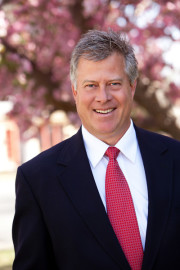About Us
About Providence Bible Church
Providence Bible Church is a non-denominational church located in Fort Collins, Colorado.
We exist to Glorify God, Edify God’s people, and Proclaim the Good News of Jesus Christ.
Our worship is centered upon our Lord Jesus Christ. It is passionate, reverent, and includes the Expository Preaching of God’s Word.
We hold to the Doctrines of Grace and the Solas of the Reformation.
Location
1516 W. Prospect
Fort Collins CO 80526
We are located between Shields and Taft Hill Road.
We meet for worship at 9:00 am Sunday
Leadership

Ron Frasco
Elder
I came to know Jesus Christ as my Savior when I was about halfway through college. I had heard the Gospel and knew that Jesus had died for sinners. I was taking a class called Great American Speakers. Our semester assignment was to research and re-deliver each speech. As God would have it, I drew four sermons and a speech by Abraham Lincoln, A House Divided (even that one was built on a Biblical text). I knew that God was trying to get my attention. It was when I came to the last speech that God tookhold of me. It was a sermon by Jonathan Edwards called Sinners in the Hands of an Angry God. I finally came to realize that I was the sinner in God’s justifiably Angry Hand! I finally saw the reason for God’s sacrifice of His own Son. I truly discovered God’s mercy, love, and forgiveness.
I graduated from The Master’s Seminary in 1993. I served in two pastorates before moving to Fort Collins to plant this church in 1998. We have served here in our great city ever since.
I am happily married to my wonderful wife, Barbara, without whom I cannot imagine serving in ministry. We are blessed with 2 adult children.
Deacons

Cliff Abeyta – Worship Planning, Sunday School Coordinator


Mike Irish – Parsonage Liason, SermonAudio

Isaac Howe – Church Building, Communion (w Redwoods)

A.J. Pritchard – Property Manager, IT

Lee Leachman – Call to Worship Coordinator

T.J. Frasco – Sound/Video System

Kevin Ruey – Spanish Church Liason
Distinctives
We believe the local church to be God’s established institution in the world for the Glorification of Himself, the Edification of the Saints, and the Evangelization of the unsaved. As we do seek to bring the Gospel to the unsaved, our desire is to enjoy ‘conversion growth’ though we will always warmly welcome like-minded believers.

We endeavor to be submitted to the authority of Scripture; to be thoroughly biblical in all that we do. We desire to do, as one has rightly said, “Where the Bible speaks, we speak; Where the Bible is silent, we too are silent,” neither placing legalistic and unscriptural demands on our fellow brethren nor degenerating into sinful indulgence by ignoring God’s clear commands. We hold God’s inspired Word to be inerrant, trustworthy, and sufficient. As such, we believe God’s Word to be sufficient for counseling, for ministry, for evangelism, and for the knowledge, wisdom, and direction of God. We affirm with the older Confessions that…
The Holy Scripture is the only sufficient, certain, and infallible rule of all saving knowledge, faith, and obedience … The whole counsel of God concerning all things necessary for his own glory, man’s salvation, faith and life, is either expressly set down or necessarily contained in the Holy Scripture: unto which nothing at any time is to be added, whether by new revelation of the Spirit, or traditions of men.
Regarding salvation, we hold to the doctrines of God’s sovereign Grace. We hold to believer’s baptism.We hold to the truths expressed in the Solas of the Reformation: Scripture alone is the source of God’s revelation; Christ alone is the Savior, Grace alone is the cause of salvation, Faith alone secures the righteousness of Christ, and the Glory of God alone is the great motivating principle of life.
As a local church, we are independent and unaffiliated with any denomination. We do, however, seek and cultivate wholesome relationships with like-minded churches.
We are governed by a body of elders defined as follows:
God-given spiritual leadership¹ consists of a multiple number² of godly³ men⁴
referred to in Scripture as ‘elders,’ ‘overseers,’ and ‘pastors’ or ‘shepherds’ ⁵
who are recognized by the local church as appointed by God,⁶ and who
jointly and humbly shepherd⁷ their loving⁸ and obedient⁹ flock.
We endeavor to honor God with genuine, Biblical worship (John 4:24). We desire to be thoroughly God-centered in this regard. We do not want to deteriorate worship into
entertainment, appealing to people’s appetites as a strategy for increasing numeric growth. Rather, we desire to focus all of our faculties on Almighty God through our Lord Jesus Christ in the power and direction of the Holy Spirit — ‘taking care of the depth of our ministry — leaving the breadth to God.’ Central to our desire to foster God-centered worship is the yearning to be edified by the preaching of ‘the whole counsel of God’ by submitting ourselves to the expository preaching of God’s Word.
We endeavor to cultivate a true fellowship of God’s people. We desire to “pursue righteousness, faith, love and peace, with those who call on the Lord from a pure heart.” (2Ti. 2:22) In our fellowship we seek to maintain “the unity of the Spirit in the bond of peace” (Eph. 4:3; cf. Phil.2:1-11) — to preserve a Biblical unity by uniting around the truth of God’s Word. We thus desire to be obedient to God’s command “that you all agree, and there be no divisions among you, but you be made complete in the same mind and in the same judgment.” (1Co. 1:10)
References
- 1 Pe. 5:1-5
- Acts 14:23;15; 20:17-18; James 5:14; 1 Ti. 5:17; Titus 1:5; Phil. 1:1; 1 Pe. 1:1; 5:1
- 1 Ti. 3:1-7; Titus 1:5-9
- 1 Ti. 2:9-3:2; 1 Cor. 14:34-36
- Acts 20:17-28; 1 Pe. 5:1-5; Titus 1:5-7; Eph. 4:11; 1 Ti. 3:1-2; Phil. 1:1
- Titus 1:5; Acts 14:23
- 1 Pe. 5:1-5; Acts 20:17-38; 21:17-26; James 5:13-26
- 1 Thes. 5:12-13; 1 Ti. 5:17-25
- 1 Pe. 2:13-14; 5:5; Hebrews 13:17
Statement of Faith
Constitution
Confession

‘Solas’ of the Reformation
Used by permission of the Alliance of Confessing Evangelicals,
1716 Spruce Street, Philadelphia PA 19103.
In the course of history words change. In our day this has happened to the word “evangelical.” In the past it served as a bond of unity between Christians from a wide diversity of church traditions. Historic evangelicalism was confessional. It embraced the essential truths of Christianity as those were defined by the great ecumenical councils of the church. In addition, evangelicals also shared a common heritage in the “solas” of the sixteenth century Protestant Reformation.
Today the light of the Reformation has been significantly dimmed. The consequence is that the word “evangelical” has become so inclusive as to have lost its meaning. We face the peril of losing the unity it has taken centuries to achieve. Because of this crisis and because of our love of Christ, his gospel and his church, we endeavor to assert anew our commitment to the central truths of the Reformation and of historic evangelicalism. These truths we affirm not because of their role in our traditions, but because we believe that they are central to the Bible.
Evangelical churches today are increasingly dominated by the spirit of this age rather than by the Spirit of Christ. As evangelicals, we call ourselves to repent of this sin and to recover the historic Christian faith.
Sola Scripture: The Erosion of Authority
Scripture alone is the inerrant rule of the church’s life, but the evangelical church today has separated Scripture from its authoritative function. In practice, the church is guided, far too often, by the culture. Therapeutic technique, marketing strategies, and the beat of the entertainment world often have far more to say about what the church wants, how it functions and what it offers, than does the Word of God. Pastors have neglected their rightful oversight of worship, including the doctrinal content of the music. As biblical authority has been abandoned in practice, as its truths have faded from Christian consciousness, and as its doctrines have lost their saliency, the church has been increasingly emptied of its integrity, moral authority and direction.
Rather than adapting Christian faith to satisfy the felt needs of consumers, we must proclaim the law as the only measure of true righteousness and the gospel as the only announcement of saving truth. Biblical truth is indispensable to the church’s understanding, nurture and discipline.
Scripture must take us beyond our perceived needs to our real needs and liberate us from seeing ourselves through the seductive images, cliches, promises and priorities of mass culture. It is only in the light of God’s truth that we understand ourselves aright and see God’s provision for our need. The Bible, therefore, must be taught and preached in the church. Sermons must be expositions of the Bible and its teachings, not expressions of the preacher’s opinions or the ideas of the age. We must settle for nothing less than what God has given.
The work of the Holy Spirit in personal experience cannot be disengaged from Scripture. The Spirit does not speak in ways that are independent of Scripture. Apart from Scripture we would never have known of God’s grace in Christ. The biblical Word, rather than spiritual experience, is the test of truth.
Thesis One: Sola Scripture
We reaffirm the inerrant Scripture to be the sole source of written divine revelation, which alone can bind the conscience. The Bible alone teaches all that is necessary for our salvation from sin and is the standard by which all Christian behavior must be measured.
We deny that any creed, council or individual may bind a Christian’s conscience, that the Holy Spirit speaks independently of or contrary to what is set forth in the Bible, or that personal spiritual experience can ever be a vehicle of revelation.
SOLUS CHRISTUS: THE EROSION OF CHRIST-CENTERED FAITH
As evangelical faith becomes secularized, its interests have been blurred with those of the culture. The result is a loss of absolute values, permissive individualism, and a substitution of wholeness for holiness, recovery for repentance, intuition for truth, feeling for belief, chance for providence, and immediate gratification for enduring hope. Christ and his cross have moved from the center of our vision.
Thesis Two: Solus Christus
We reaffirm that our salvation is accomplished by the mediatorial work of the historical Christ alone. His sinless life and substitutionary atonement alone are sufficient for our justification and reconciliation to the Father.
We deny that the gospel is preached if Christ’s substitutionary work is not declared and faith in Christ and his work is not solicited.
SOLA GRATIA: THE EROSION OF THE GOSPEL
Unwarranted confidence in human ability is a product of fallen human nature. This false confidence now fills the evangelical world; from the self-esteem gospel, to the health and wealth gospel, from those who have transformed the gospel into a product to be sold and sinners into consumers who want to buy, to others who treat Christian faith as being true simply because it works. This silences the doctrine of justification regardless of the official commitments of our churches.
God’s grace in Christ is not merely necessary but is the sole efficient cause of salvation. We confess that human beings are born spiritually dead and are incapable even of cooperating with regenerating grace.
Thesis Three: Sola Gratia
We reaffirm that in salvation we are rescued from God’s wrath by his grace alone. It is the supernatural work of the Holy Spirit that brings us to Christ by releasing us from our bondage to sin and raising us from spiritual death to spiritual life.
We deny that salvation is in any sense a human work. Human methods, techniques or strategies by themselves cannot accomplish this transformation. Faith is not produced by our unregenerated human nature.
SOLA FIDE: THE EROSION OF THE CHIEF ARTICLE
Justification is by grace alone through faith alone because of Christ alone. This is the article by which the church stands or falls. Today this article is often ignored, distorted or sometimes even denied by leaders, scholars and pastors who claim to be evangelical. Although fallen human nature has always recoiled from recognizing its need for Christ’s imputed righteousness, modernity greatly fuels the fires of this discontent with the biblical Gospel. We have allowed this discontent to dictate the nature of our ministry and what it is we are preaching.
Many in the church growth movement believe that sociological understanding of those in the pew is as important to the success of the gospel as is the biblical truth which is proclaimed. As a result, theological convictions are frequently divorced from the work of the ministry. The marketing orientation in many churches takes this even further, erasing the distinction between the biblical Word and the world, robbing Christ’s cross of its offense, and reducing Christian faith to the principles and methods which bring success to secular corporations.
While the theology of the cross may be believed, these movements are actually emptying it of its meaning. There is no gospel except that of Christ’s substitution in our place whereby God imputed to him our sin and imputed to us his righteousness. Because he bore our judgment, we now walk in his grace as those who are forever pardoned, accepted and adopted as God’s children. There is no basis for our acceptance before God except in Christ’s saving work, not in our patriotism, churchly devotion or moral decency. The gospel declares what God has done for us in Christ. It is not about what we can do to reach him.
Thesis Four: Sola Fide
We reaffirm that justification is by grace alone through faith alone because of Christ alone. In justification Christ’s righteousness is imputed to us as the only possible satisfaction of God’s perfect justice.
We deny that justification rests on any merit to be found in us, or upon the grounds of an infusion of Christ’s righteousness in us, or that an institution claiming to be a church that denies or condemns sola fide can be recognized as a legitimate church.
SOLI DEO GLORIA: THE EROSION OF GOD-CENTERED WORSHIP
Wherever in the church biblical authority has been lost, Christ has been displaced, the gospel has been distorted, or faith has been perverted, it has always been for one reason: our interests have displaced God’s and we are doing his work in our way. The loss of God’s centrality in the life of today’s church is common and lamentable. It is this loss that allows us to transform worship into entertainment, gospel preaching into marketing, believing into technique, being good into feeling good about ourselves, and faithfulness into being successful. As a result, God, Christ and the Bible have come to mean too little to us and rest too inconsequentially upon us.
God does not exist to satisfy human ambitions, cravings, the appetite for consumption, or our own private spiritual interests. We must focus on God in our worship, rather than the satisfaction of our personal needs. God is sovereign in worship; we are not. Our concern must be for God’s kingdom, not our own empires, popularity or success.
Thesis Five: Soli Deo Gloria
We reaffirm that because salvation is of God and has been accomplished by God, it is for God’s glory and that we must glorify him always. We must live our entire lives before the face of God, under the authority of God and for his glory alone.
We deny that we can properly glorify God if our worship is confused with entertainment, if we neglect either Law or Gospel in our preaching, or if self-improvement, self-esteem or self- fulfillment are allowed to become alternatives to the gospel
